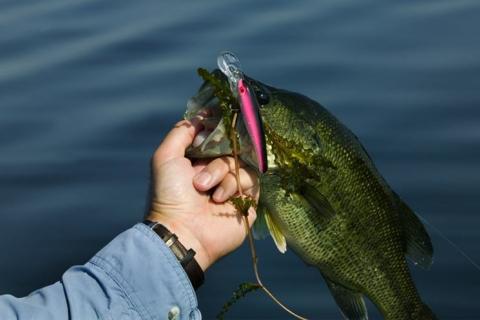
Marcel Veenstra, professional fishing guide and tournament pro, guides on Lake St. Claire and the inland lakes in Michigan up to 150 days a year when weather permits. As spring arrives, he’ll focus on breaking in his new boat and fishing blade baits for largemouth on his favorite lakes. Marcel Venstra has been fishing tournaments for over 20 years specializing in Michigan's Smallmouth and Largemouth Bass fishing.
Where to Look for to Get the Best Blade Bait Action
 The best blade bait bite happens when water temps range from 48- to 55-degrees.
The best blade bait bite happens when water temps range from 48- to 55-degrees.
Most importantly, Veenstra looks for where the bass will spawn and will back off to the spawning flats and then look for a deep funnel that will come up on those spawning flats once the ice is out. Usually bass will hold a little deeper waiting to move up and those funnel areas are almost a holding pen for the largemouth waiting to move up onto the flat.
“I have a spot on a local lake where there is a little road bed that goes across. The whole bay and back of the road bed is 4- to 6-feet deep,” he started. “But, in front of that road bed and just on the other side of that road bed, there is 8- to 10- feet of water. Once the ice is out, those largemouth will stack in there.”
Veenstra prefers an area with a clean bottom for his blade bait to come through. “Gravel or sand spots are ideal. If you have some holes or troughs with sand and grass in them, that is where they line up. Those funnels are like migratory troughs into the shallows.”
Lure Cadence is an Important Part of Presentation When Fishing
Since the water is super clear, long casts are key. Veenstra will let the blade bait flutter to the bottom, let it sit for a second or two then, then lift the rod tip up a foot.
 The best way to know that you are working the bait properly is when vibration of the blade bait as you lift it. That said, the colder the water, the longer you can let it lay on the bottom.
The best way to know that you are working the bait properly is when vibration of the blade bait as you lift it. That said, the colder the water, the longer you can let it lay on the bottom.
“Sometimes they’ll hit it on the fall, or the rise, but a lot of times they’ll hit it while its laying on the bottom. You’ll feel the thump when they pick it up,” Veenstra said.
The vibration of the blade bait is key to triggering strikes. If you feel some grass on your bait, give it a quick rip to clean it off as that can often draw a reaction strike.
 |
| Gamakatsu EWG Treble Hook - Short Shank |
The Hookset and a Firm Hook-Up
To set the hook, he’ll lift into the fish and start reeling- most often that’s all it takes. “The strikes are not vicious. It’s not like they eat it and run it, a lot of times they are just on there like dead weight,” he said.
Lure Choices for the Lakes
Most of the lakes he fishes have clear water so a ½-ounce gold blade fishing bait is his first choice, especially when its sunny. All other times, he’ll opt for a silver colored bait. While he prefers the Blitz Lures blade bait, he admits the Silver Buddy is a popular choice also.
If he’s hooked a bunch of fish in a school and they turn off, he’ll switch to a purple blade bait with a black back to fire them up again.
Currently, he’s found successes fishing the Gamakatsu EWG short shank trebles hooks that he’ll upsize from the stock hooks installed at the factory.
 |
| Sunline Super FC Sniper Fluorocarbon Line |
Tackle Talk
If the lake he’s fishing doesn’t have any wood in it, he’ll opt for 20-pound Power Pro braided main line with a 10- to 12-pound Sunline FC Sniper fluorocarbon leader line. If wood is present, he’ll upsize his fluorocarbon leader to 17-pound test.
 |
| Shimano Stradic FK Spinning Reel |
A rod with a fast tip won’t work- he wants to feel the vibration of the bait but the rod needs to be limber enough to allow the bass to engulf the bait.
He prefers a 7-foot medium heavy G-Loomis IMX spinning fishing rod paired with a Shimano Stradic 2500 reel (https://www.basspro.com/shop/en/shimano-stradic-fk-spinning-reel). When using a bait caster, he’ll opt for the same rod in a bait cast model but he’ll pair with a high-speed Shimano Curado reel.
- 5794 views

